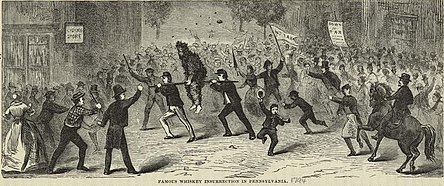Riding a rail
Riding the rail (also called being "run out of town on a rail") was a punishment most prevalent in the United States in the 18th and 19th centuries in which an offender was made to straddle a fence rail held on the shoulders of two or more bearers. The subject was then paraded around town or taken to the city limits and dumped by the roadside.

Being ridden on a rail was typically a form of extrajudicial punishment administered by a mob, sometimes in connection with tarring and feathering,[1] intended to show community displeasure with the offender so they either conformed their behavior to the mob's demands or left the community.

A story attributed to Abraham Lincoln has him quoting a victim of being ridden out of town on a rail as having said, "If it weren't for the honor of the thing, I'd just as soon it happened to someone else."[2]
In Popular Culture
In the film O Brother, Where Art Thou?, Homer Stokes denounces the Soggy Bottom Boys as hostile to the social order, accusing them of associating with African Americans. Stokes then reveals that he is a member of the Ku Klux Klan, further angering the crowd, whereupon they run him out of town on a rail.
See also
References
- John S Farmer (1889). Farmer's Dictionary of Americanisms – Old and New. London: Reeves and Turner. p. 448.
- Cuomo, Governor Mario M. (1986). "Abraham Lincoln and Our "Unfinished Work"". Journal of the Abraham Lincoln Association. 8 (1). hdl:2027/spo.2629860.0008.106.
